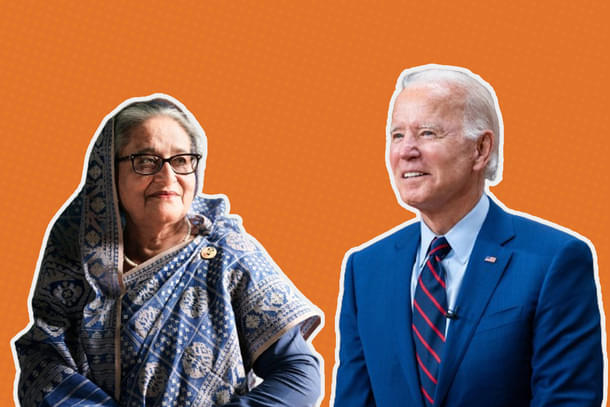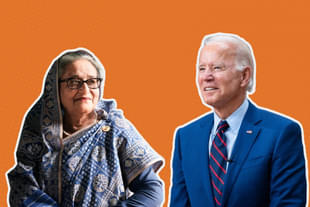World
Bangladesh: The Regime Change People Have Won
Swarajya Staff
Aug 05, 2024, 04:32 PM | Updated 05:02 PM IST
Save & read from anywhere!
Bookmark stories for easy access on any device or the Swarajya app.


Bangladesh Prime Minister Sheikh Hasina has been deposed. While this might come as a surprise to some, it’s hardly unexpected.
It’s almost as if the writing had been on the wall for quite some time. The recent escalation of protests certainly played a role, but it seems clear that the powers that be were already determined to remove her.
As 2023 drew to a close, Bangladesh was gearing up for its general elections, slated for January 2024. The United States had publicly expressed its discontent with Hasina.
As is often the case with US criticisms, the pretext was the defence of "democracy."
The US imposed sanctions on military officers deemed close to the prime minister, citing allegations of misconduct. It also engaged with the opposition, specifically the Bangladesh Nationalist Party (BNP), which had ties with Jamaat-e-Islami, an Islamist group linked to extremists and terrorists.
It had even issued veiled threats to Hasina, warning that American cooperation with Dhaka would be jeopardised unless she conceded to opposition demands for a caretaker government to oversee the elections.
The actions of the US not only emboldened the Islamist opposition but also granted unwarranted legitimacy to its demands.
Hasina, fully aware of the machinations unfolding, defiantly refused to budge.
In the January elections, the Awami League won 223 out of 300 seats in Parliament. Despite this decisive victory, the US and Western allies maintained that the elections were neither free nor fair. Their criticism stemmed from Hasina’s refusal to meet the demands of Islamist opposition, with which the US had aligned itself.
Just seven months later, Hasina has been pushed out of power.
The main spark for the unrest was frustration over the quota system, but it’s not out of the question that those behind the regime change received some backing or encouragement from the US and other international players.
It’s no secret that Hasina travelled to New Delhi twice in quick succession in June this year, right after India’s election season ended. Clearly, something was brewing, and both Dhaka and New Delhi were well aware of it.
They had faced similar situations before, most notably in 2009, when India had prepared a military unit to deploy in Dhaka to protect Hasina.
It was India's intervention on Hasina's behalf that had forced the US to back off from escalating tensions with the Awami League government ahead of the January elections.
Hasina is viewed as a reliable ally in New Delhi.
She has not only delivered political stability and economic growth for Bangladesh but also kept Islamist groups in check, ensuring that no anti-India factions, which had flourished under the BNP, could operate from there.
While many of India’s neighbours have struggled with instability and Chinese influence, Bangladesh has stayed steady. India used this argument with the US, and it seems to have been effective.
However, with Hasina now out of power, New Delhi’s position is precarious. If the situation in Bangladesh deteriorates, India could face serious consequences.
Such a scenario could not only open the door for the ISI to re-enter Bangladesh, as it did during BNP rule, but also give China a freer hand in the region.
The opposition in Bangladesh has portrayed Hasina as an Indian puppet, and if they manage to take power in Dhaka, they’re unlikely to cooperate on these critical issues.
But for now, it seems, this is the reality that India must contend with — the forces of regime change have prevailed.





